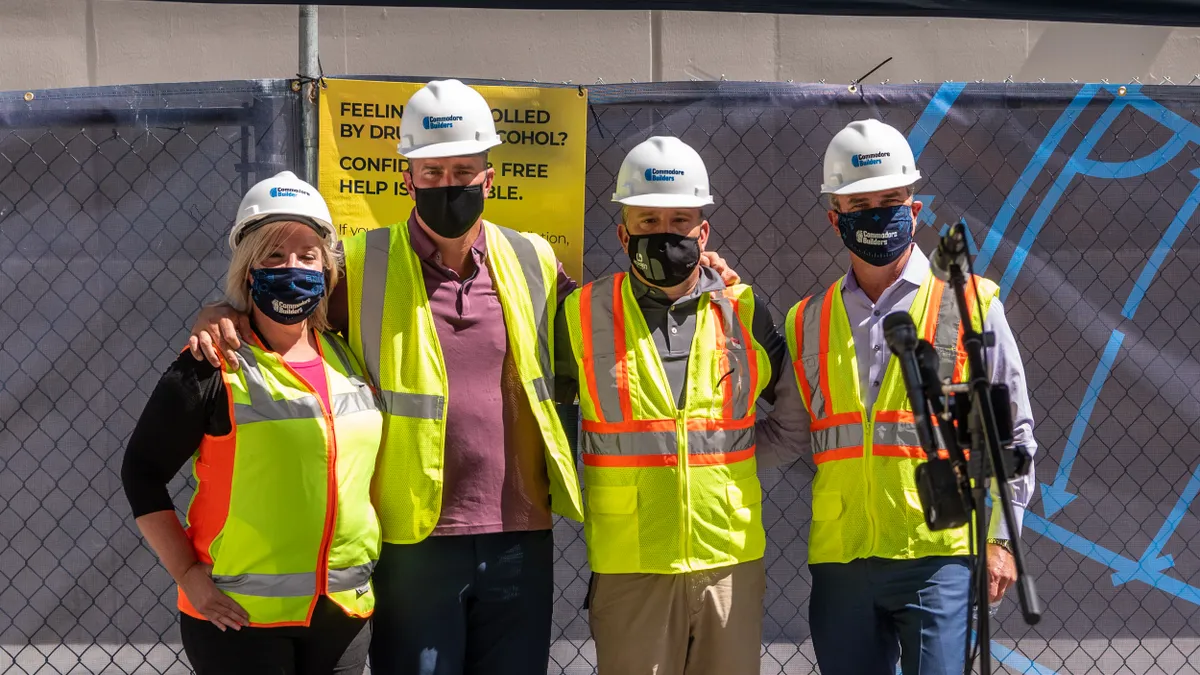Dive Brief:
- Boston-based construction management firm Commodore Builders has announced an expansion of its substance abuse recovery offering to include all subcontractors and tradespeople on its jobsites.
- Previously, the one-year-old program, designed to help workers find rehabilitation centers, was only offered to Commodore employees and their families. The expansion adds more than 500 people.
- While Commodore’s new plan was in the works before the COVID-19 pandemic reached the U.S., it comes at an opportune time. Drug deaths have risen 13% this year compared to 2019, according to the New York Times.
Dive Insight:
COVID-19 has exacerbated the opioid epidemic in the U.S., and the increasing number of drug-related fatalities doesn’t include overdoses that don’t result in death, said Kevin Mikolazyk, executive director with the Herren Project, provider of Commodore's substance abuse program. With the pandemic, work is less certain and times are more stressful than ever, which has made some Americans turn to opioids.
Construction is a dangerous industry, and injuries sustained on the job can directly impact a workers’ earning potential. Workers with injuries will often take oxycontin or other opioids — legally prescribed or obtained illegally — in order to continue to work through the pain, said Lisa Ulbrich, Commodore vice president, who herself has been in recovery for nine years.
According to the Substance Abuse and Mental Health Services Administration, construction workers have the second-highest rate of substance abuse of all U.S. professions. The industry has a 17.3% rate of abuse, just slightly behind the top sector, Accommodation and Food Services, at 17.4%.
Offering the outreach program to families from the start was key, both Mikolazyk and Ulbrich said, as often the ones struggling with substance use or abuse aren’t the only people impacted. Opening up the program to allow spouses or other relatives to reach out to the Herren Project and get a roadmap to help aid their loved ones is part of what made the program’s initial year successful.
While COVID-19 helped to cause the spike in opioid overdoses, Mikolazyk said, other drugs and alcohol are being abused in greater numbers now, too.
Though it’s not a secret that there is a substance abuse problem in the construction workforce, Ulbrich and Mikolazyk said most contractors aren’t doing enough. While some keep Narcan on the site in case of an overdose, Mikolazyk said, that is merely a safety net that can only help save a worker’s life once there’s already a problem.
Mikolazyk said the Herren Project is different from other programs in that the group doesn’t just point in the direction of rehab centers nearby, but provides families a roadmap to recovery, while vetting rehab centers to find the best fit. For instance, a place that is suitable for a construction worker probably won't be a 14-year old with a drug problem, Mikolazyk said.
To Ulbrich, providing free support to employees is just another way of ensuring jobsites are safe. It’s no different from a helmet or a mask; worker health is part of worker safety, she said.
“The program was put together with the idea that it could be replicated [by other construction companies],” Ulbrich said. “My hope is that it is just the first of its kind."














